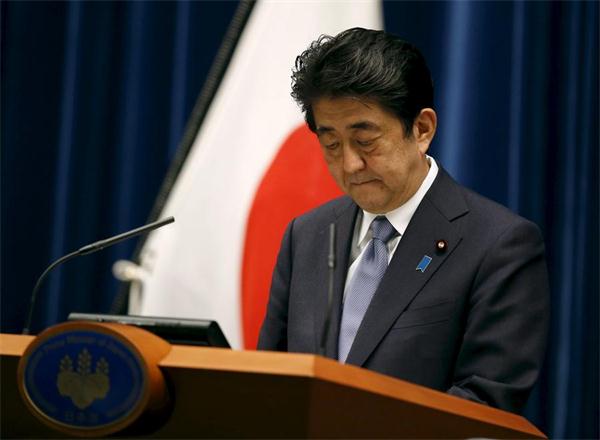Abe playing to a gallery
Updated: 2015-08-18 07:42
(China Daily)
|
|||||||||||
 |
|
Japan's Prime Minister Shinzo Abe attends a news conference to deliver a statement marking the 70th anniversary of World War Two's end, at his official residence in Tokyo August 14, 2015. Abe, in a statement marking the 70th anniversary of World War Two's end, acknowledged Japan had inflicted "immeasurable damage and suffering" on innocent people but said generations not involved in the conflict should not be burdened with continued apologies. [Photo/Agencies] |
Japanese Prime Minister Shinzo Abe's ambiguous remarks on Friday in his speech to commemorate Japan's defeat in World War II reflect an elusive attitude toward core issues and his lack of sincere repentance for wartime crimes.
Abe's speech has invoked criticism and suspicion both at home and abroad. In an editorial, Asahi Shimbun claimed that Abe's ambiguous attitude has made people wonder for whom he was speaking. Mainichi Shimbun said that the focus of the speech, made at a time when the public approval rating for Abe's Cabinet is sagging because of people's opposition to the new security bills Abe is trying to push through parliament, had shifted from the crucial issues, such as an apology, to some lesser ones.
On Saturday, a day after Abe made these remarks and also the 70th anniversary of Japan's surrender in World War II, Abe's aide Koichi Hagiuda sent a cash offering on behalf of Abe to the Yasukuni Shrine where 14 Class-A war criminals are honored among the numerous war dead.
It is irresponsible for any Japanese leader to hold an equivocal attitude toward Japan's wartime crimes. Some of Abe's words have exhibited an intention to cater to political forces who deny Japan's acts of aggression and who refuse to make an apology for its war crimes. However, any move made with such an ulterior political motive is in open contempt of international law and will only lead Japanese people further astray.
Japanese people long to live in a country that can completely bid farewell to its history of aggression and adhere to peaceful development, but that requires Japan to face up to its wartime crimes and profoundly reflect on that period of history, in order to win forgiveness from its neighbors and win their respect.
The above is an abridgement of a People's Daily article published on Monday.
Related Stories
S. Korea weighs ties with Japan on Abe's action 2015-08-17 15:14
Abe's 'apology' lacks sincerity 2015-08-17 11:19
Abe's sleight of tongue cannot hide truth 2015-08-17 07:58
Yasukuni homages show how hollow Abe's words were 2015-08-17 07:58
Today's Top News
Sodium cyanide in Tianjin to be cleared
Premier Li pledges thorough investigation into deadly blasts
Explosion in Thai capital kills 27
Port operations return to normal after Tianjin blasts
Experts say J-10s would benefit Iran
British large companies' bosses paid 183 times average UK worker
Indonesia rescuers head to mountains in missing plane search
Questions remain as fires put out after Tianjin blasts
Hot Topics
Lunar probe , China growth forecasts, Emission rules get tougher, China seen through 'colored lens', International board,
Editor's Picks

|

|

|

|

|

|






